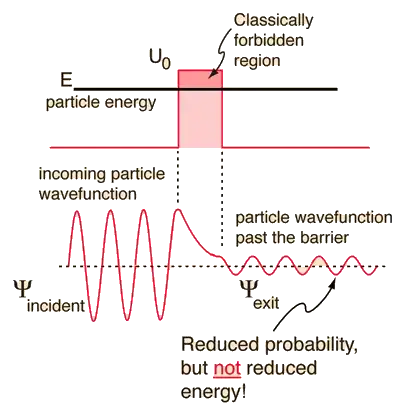I do understand that nothing can escape a BH (not particles, no information), and this question is not about why you cannot escape. This question is not about Hawking radiation, and I do understand that there are different explanations about Hawking radiation, and one of them is tunneling.
I have read this question:
Why can't you escape a black hole?
where Anixx says:
It is actually possible to get out of the horizon. To get out one only have to reach speed higher than c. Note that in all cases of tunelling (say at nucleus decay) the emitted particle reaches higher than c speed.
Quantum tunnelling near the speed of light
where annav says:
The impotant thing to keep in mind is that the energy level is the same inside and outside the barrier, thus the particle must have the same momentum i.e. velocity all through.
So one of them says that tunneling particles are able to escape a black hole, and they reach a speed faster then the speed of light. In this case, nuclear decay just inside the horizon would cause particles to escape the BH.
The other one says during tunneling, the velocity of the particle must be the same inside and outside the barrier, so it must be less then c (if it has rest mass), but it cannot be faster then c.
Now I believe there are two main contradictions here:
- particles with rest mass traveling at speed c or any particle traveling faster then c is a violation of SR (causality)
What everyone else said, but note that this STILL violates causality if you use general relativity to create one of these "warp drive" scenarios--the "warp drive" can always be restricted to an arbitrarily small region of spacetime, and then special relativity will be true over the rest of spacetime, and the problems will still arise.
How does faster than light travel violate causality?
- actually even tunneling particles cannot escape a black hole, because Hawking radiation is explained by negative energy particles entering the BH, thus reducing its mass (evaporating)
https://physics.stackexchange.com/a/250844/132371
Anyhow, since energy is associated with the time coordinate and momentum with the spatial coordinates, the energy and radial momentum of a particle also swap "roles" when crossing the horizon. The negative energy of the particle becomes negative momentum and the positive momentum of the particle becomes positive energy.
Black holes and positive/negative-energy particles
So in reality, no real particles can tunnel out of a black hole, and even those (tunelling) do not exceed the speed of light.
Question:
- Can you escape a BH by tunneling faster then the speed of light?
